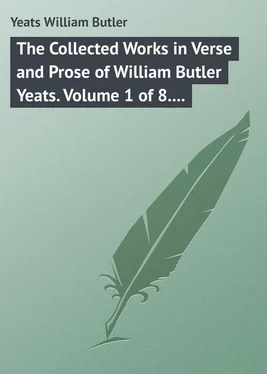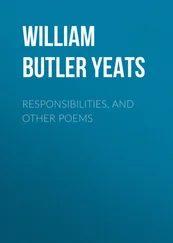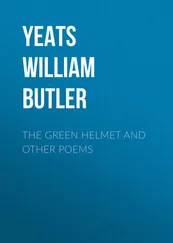William Yeats - The Collected Works in Verse and Prose of William Butler Yeats. Volume 1 of 8. Poems Lyrical and Narrative
Здесь есть возможность читать онлайн «William Yeats - The Collected Works in Verse and Prose of William Butler Yeats. Volume 1 of 8. Poems Lyrical and Narrative» — ознакомительный отрывок электронной книги совершенно бесплатно, а после прочтения отрывка купить полную версию. В некоторых случаях можно слушать аудио, скачать через торрент в формате fb2 и присутствует краткое содержание. ISBN: , Жанр: foreign_language, foreign_prose, на английском языке. Описание произведения, (предисловие) а так же отзывы посетителей доступны на портале библиотеки ЛибКат.
- Название:The Collected Works in Verse and Prose of William Butler Yeats. Volume 1 of 8. Poems Lyrical and Narrative
- Автор:
- Жанр:
- Год:неизвестен
- ISBN:http://www.gutenberg.org/ebooks/49608
- Рейтинг книги:4 / 5. Голосов: 1
-
Избранное:Добавить в избранное
- Отзывы:
-
Ваша оценка:
- 80
- 1
- 2
- 3
- 4
- 5
The Collected Works in Verse and Prose of William Butler Yeats. Volume 1 of 8. Poems Lyrical and Narrative: краткое содержание, описание и аннотация
Предлагаем к чтению аннотацию, описание, краткое содержание или предисловие (зависит от того, что написал сам автор книги «The Collected Works in Verse and Prose of William Butler Yeats. Volume 1 of 8. Poems Lyrical and Narrative»). Если вы не нашли необходимую информацию о книге — напишите в комментариях, мы постараемся отыскать её.
The Collected Works in Verse and Prose of William Butler Yeats. Volume 1 of 8. Poems Lyrical and Narrative — читать онлайн ознакомительный отрывок
Ниже представлен текст книги, разбитый по страницам. Система сохранения места последней прочитанной страницы, позволяет с удобством читать онлайн бесплатно книгу «The Collected Works in Verse and Prose of William Butler Yeats. Volume 1 of 8. Poems Lyrical and Narrative», без необходимости каждый раз заново искать на чём Вы остановились. Поставьте закладку, и сможете в любой момент перейти на страницу, на которой закончили чтение.
Интервал:
Закладка:
And poets found, old writers say,
A yew tree where his body lay;
But a wild apple hid the grass
With its sweet blossom where hers was;
And being in good heart, because
A better time had come again
After the deaths of many men,
And that long fighting at the ford,
They wrote on tablets of thin board,
Made of the apple and the yew,
All the love stories that they knew.
Let rush and bird cry out their fill
Of the harper’s daughter if they will,
Beloved, I am not afraid of her.
She is not wiser nor lovelier,
And you are more high of heart than she,
For all her wanderings over-sea;
But I’d have bird and rush forget
Those other two; for never yet
Has lover lived, but longed to wive
Like them that are no more alive.
IN THE SEVEN WOODS
I have heard the pigeons of the Seven Woods
Make their faint thunder, and the garden bees
Hum in the lime tree flowers; and put away
The unavailing outcries and the old bitterness
That empty the heart. I have forgot awhile
Tara uprooted, and new commonness
Upon the throne and crying about the streets
And hanging its paper flowers from post to post,
Because it is alone of all things happy.
I am contented for I know that Quiet
Wanders laughing and eating her wild heart
Among pigeons and bees, while that Great Archer,
Who but awaits His hour to shoot, still hangs
A cloudy quiver over Parc-na-Lee.
THE ARROW
I thought of your beauty, and this arrow,
Made out of a wild thought, is in my marrow.
There’s no man may look upon her, no man;
As when newly grown to be a woman,
Blossom pale, she pulled down the pale blossom
At the moth hour and hid it in her bosom.
This beauty’s kinder, yet for a reason
I could weep that the old is out of season.
THE FOLLY OF BEING COMFORTED
One that is ever kind said yesterday:
‘Your well-beloved’s hair has threads of grey,
And little shadows come about her eyes;
Time can but make it easier to be wise,
Though now it’s hard, till trouble is at an end;
And so be patient, be wise and patient, friend.’
But, heart, there is no comfort, not a grain;
Time can but make her beauty over again,
Because of that great nobleness of hers;
The fire that stirs about her, when she stirs
Burns but more clearly. O she had not these ways,
When all the wild summer was in her gaze.
O heart! O heart! if she’d but turn her head,
You’d know the folly of being comforted.
OLD MEMORY
I thought to fly to her when the end of day
Awakens an old memory, and say,
‘Your strength, that is so lofty and fierce and kind,
It might call up a new age, calling to mind
The queens that were imagined long ago,
Is but half yours: he kneaded in the dough
Through the long years of youth, and who would have thought
It all, and more than it all, would come to naught,
And that dear words meant nothing?’ But enough,
For when we have blamed the wind we can blame love;
Or, if there needs be more, be nothing said
That would be harsh for children that have strayed.
NEVER GIVE ALL THE HEART
Never give all the heart, for love
Will hardly seem worth thinking of
To passionate women if it seem
Certain, and they never dream
That it fades out from kiss to kiss;
For everything that’s lovely is
But a brief dreamy kind delight.
O never give the heart outright,
For they, for all smooth lips can say,
Have given their hearts up to the play.
And who could play it well enough
If deaf and dumb and blind with love?
He that made this knows all the cost,
For he gave all his heart and lost.
THE WITHERING OF THE BOUGHS
I cried when the moon was murmuring to the birds,
‘Let peewit call and curlew cry where they will,
I long for your merry and tender and pitiful words,
For the roads are unending, and there is no place to my mind.’
The honey-pale moon lay low on the sleepy hill,
And I fell asleep upon lonely Echtge of streams.
No boughs have withered because of the wintry wind;
The boughs have withered because I have told them my dreams.
I know of the leafy paths that the witches take,
Who come with their crowns of pearl and their spindles of wool,
And their secret smile, out of the depths of the lake;
I know where a dim moon drifts, where the Danaan kind
Wind and unwind their dances when the light grows cool
On the island lawns, their feet where the pale foam gleams.
No boughs have withered because of the wintry wind;
The boughs have withered because I have told them my dreams.
I know of the sleepy country, where swans fly round
Coupled with golden chains, and sing as they fly.
A king and a queen are wandering there, and the sound
Has made them so happy and hopeless, so deaf and so blind
With wisdom, they wander till all the years have gone by;
I know, and the curlew and peewit on Echtge of streams.
No boughs have withered because of the wintry wind;
The boughs have withered because I have told them my dreams.
ADAM’S CURSE
We sat together at one summer’s end,
That beautiful mild woman, your close friend,
And you and I, and talked of poetry.
I said: ‘A line will take us hours maybe;
Yet if it does not seem a moment’s thought,
Our stitching and unstitching has been naught.
Better go down upon your marrow bones
And scrub a kitchen pavement, or break stones
Like an old pauper, in all kinds of weather;
For to articulate sweet sounds together
Is to work harder than all these, and yet
Be thought an idler by the noisy set
Of bankers, schoolmasters, and clergymen
The martyrs call the world.’
That woman then
Murmured with her young voice, for whose mild sake
There’s many a one shall find out all heartache
In finding that it’s young and mild and low:
‘There is one thing that all we women know,
Although we never heard of it at school —
That we must labour to be beautiful.’
I said: ‘It’s certain there is no fine thing
Since Adam’s fall but needs much labouring.
There have been lovers who thought love should be
So much compounded of high courtesy
That they would sigh and quote with learned looks
Precedents out of beautiful old books;
Yet now it seems an idle trade enough.’
We sat grown quiet at the name of love;
We saw the last embers of daylight die,
And in the trembling blue-green of the sky
A moon, worn as if it had been a shell
Washed by time’s waters as they rose and fell
About the stars and broke in days and years.
I had a thought for no one’s but your ears;
That you were beautiful, and that I strove
To love you in the old high way of love;
That it had all seemed happy, and yet we’d grown
As weary hearted as that hollow moon.
RED HANRAHAN’S SONG ABOUT IRELAND
The old brown thorn trees break in two high over Cummen Strand,
Under a bitter black wind that blows from the left hand;
Our courage breaks like an old tree in a black wind and dies,
But we have hidden in our hearts the flame out of the eyes
Of Cathleen, the daughter of Houlihan.
Интервал:
Закладка:
Похожие книги на «The Collected Works in Verse and Prose of William Butler Yeats. Volume 1 of 8. Poems Lyrical and Narrative»
Представляем Вашему вниманию похожие книги на «The Collected Works in Verse and Prose of William Butler Yeats. Volume 1 of 8. Poems Lyrical and Narrative» списком для выбора. Мы отобрали схожую по названию и смыслу литературу в надежде предоставить читателям больше вариантов отыскать новые, интересные, ещё непрочитанные произведения.
Обсуждение, отзывы о книге «The Collected Works in Verse and Prose of William Butler Yeats. Volume 1 of 8. Poems Lyrical and Narrative» и просто собственные мнения читателей. Оставьте ваши комментарии, напишите, что Вы думаете о произведении, его смысле или главных героях. Укажите что конкретно понравилось, а что нет, и почему Вы так считаете.












